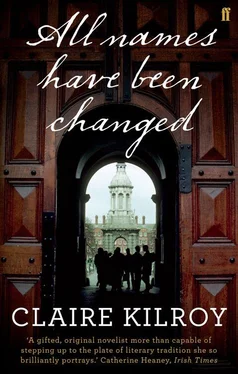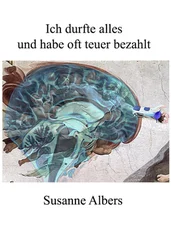Claire Kilroy - All Names Have Been Changed
Здесь есть возможность читать онлайн «Claire Kilroy - All Names Have Been Changed» весь текст электронной книги совершенно бесплатно (целиком полную версию без сокращений). В некоторых случаях можно слушать аудио, скачать через торрент в формате fb2 и присутствует краткое содержание. Год выпуска: 2010, Издательство: Faber & Faber, Жанр: Современная проза, на английском языке. Описание произведения, (предисловие) а так же отзывы посетителей доступны на портале библиотеки ЛибКат.
- Название:All Names Have Been Changed
- Автор:
- Издательство:Faber & Faber
- Жанр:
- Год:2010
- ISBN:нет данных
- Рейтинг книги:5 / 5. Голосов: 1
-
Избранное:Добавить в избранное
- Отзывы:
-
Ваша оценка:
- 100
- 1
- 2
- 3
- 4
- 5
All Names Have Been Changed: краткое содержание, описание и аннотация
Предлагаем к чтению аннотацию, описание, краткое содержание или предисловие (зависит от того, что написал сам автор книги «All Names Have Been Changed»). Если вы не нашли необходимую информацию о книге — напишите в комментариях, мы постараемся отыскать её.
All Names Have Been Changed — читать онлайн бесплатно полную книгу (весь текст) целиком
Ниже представлен текст книги, разбитый по страницам. Система сохранения места последней прочитанной страницы, позволяет с удобством читать онлайн бесплатно книгу «All Names Have Been Changed», без необходимости каждый раз заново искать на чём Вы остановились. Поставьте закладку, и сможете в любой момент перейти на страницу, на которой закончили чтение.
Интервал:
Закладка:
It is almost certain that I was alone in that lecture hall in experiencing a moment of enlightenment. I wanted to speak up to let Glynn know that at least one of those blank faces lined up before him had grasped something of what he’d been trying to communicate to us that night, but I didn’t budge from my back-row entrenchment, and the department head led him away. Physics, Glynn mistakenly believed, had equipped him with the vocabulary to depict something else entirely, something that wasn’t physical at all, or quantifiable, or even describable, but which he still, despite these multiple impasses, managed to evoke in his novels. Here we run into representational difficulties of our own.
Glynn was onto something ideational, something the audience before him lacked the curiosity to understand, it being a phenomenon of no interest to the practical mind. There are extrasensory faculties at work that cannot be adequately explained. It is not my intention to sound so portentous. Stare at someone hard enough and they will feel your gaze. Keep staring, and they will turn around to identify the source of it. Glynn perceived those forces that whirred about us, and whirred us about, when we appeared to be at rest. He saw those pulsations spooling from our fingertips like dragonflies through the air. It is difficult to explain. I have a memory of a walk I took along a country lane. It was late May, or early June, one of those still, momentous evenings brimming with promise, when life finally seems on the brink of commencing and all is yet to play for. Meadows unrolled on either side as I descended into the valley, the seed heads of the wild grasses tipped gold in the setting sun. I had nowhere to be that night.
The lane below curved around an outcrop of rock and disappeared out of sight behind the grove of flowering whitethorn which had so strongly scented the evening air. I sensed the presence of a small party of people on the other side, making their way up the hill. I had caught a strain of laughter on the air, gaiety, a thrumming. As I rounded the corner into the shadows of the grove, I prepared to encounter faces on the other side. The other side, however, was bare.
I paused in the middle of the lane in confusion. The shafts of sunlight piercing the dun shade quivered like plucked strings. That thrumming was everywhere; the valley, the meadows, the hedgerows, on the breeze. The whitethorns were loud with the drone of bees, but it was more than that. Something had been interrupted.
This wavering, I propose, approximates on some level to the condition of being Glynn — living with that swarm of nascent activity alongside you, that charge of potential energy, that flux. I am applying scientific terms to artistic ends, using the technique propounded by the master. Except that upon rounding the corner, instead of almost encountering them, as I almost encountered them, Glynn saw the faces of the people in his path, their colourful clothes, their longing for each other revealed in their gait, desires divulged by subtle tilts and inclinations. Sometimes they even took him with them, off on their summer adventures. Where did they all disappear to? Into which Kavanagh poem?
The world, when I picked up Guinevere’s hand and led her out of the sun-pink workshop, was not the same place it had been that morning. There was a before and an after. We saw not just pavement, city and sky, but future tenses swirling around us. The wet surface of Dame Street glinted silver as we emerged from the Arch, blinding Guinevere with the glare. I shielded her eyes with my hand before leaning in to kiss her.
I picked her up outside City Hall and twirled her in the air. Guinevere Wren was no weight at all. She laughed, her coiled hair streaming out behind her, and I realised I could not be happier. It was not possible to be any happier. She was the difference between the sun shining and not. ‘Put me down!’ she shrieked, but I couldn’t bear to. Though I’d walked that street a thousand times without her, our first walk together would eclipse all previous walks. I knew that even as the journey was unfolding. Dame Street would never be detached from my memory of walking it, practically running it, hand in hand with Guinevere. She was taking me to her room.
The sky seemed terribly high up later that day as we lay on our backs looking out at it from her tangled bed. The rush of air had gone to our heads. It was deep blue and dotted about with small white scudding clouds. They were perfect clouds, spot on, I couldn’t have asked for better. Round, plump, flocculent, the kind you’d like to fall asleep on. A tear had formed in the corner of Guinevere’s eye. It was the most beautiful tear I had ever seen, an absolute credit to her. I didn’t know whether to mention it or not. A butterfly had once closed its wings to me, barely a butterfly any more then, really, no better than an old brown leaf. I’d nudged the thing with my foot, expecting it to flutter away and reveal its pretty colours once more, but the tiny scrap clung tightly to the path and my boot destroyed it.
The tear swelled and spilled down Guinevere’s cheek. I turned back to consider the panorama of sky. It took all my restraint not to try to prise her open. I wished I knew more about types of clouds, about the atmospheric conditions necessary to sustain those small white pillowy ones. And I wish I’d known more about the conditions necessary to sustain Guinevere. I never thought to ask.
17 The Book of Evidence
It had started again, as if the coming together of Guinevere and I had tipped a scale, setting some vast rusty mechanism grinding back into motion, unleashing those turning forces Glynn had discoursed upon that evening in Earlsfort Terrace. He was writing once more. A heart that had been still a long time contracted and squeezed out a beat just as we’d given up on it. Glynn was a master of cliffhanger timing.
The discovery was made the following Wednesday. Guinevere had deemed it inappropriate that she and I arrive at the workshop together, so I had been dispatched ahead. We had kissed goodbye on the doorstep of the labourer’s cottage she rented in the Liberties. She shared it with a theology student who was never there but who showed up in the dead of the night to move beer cans around as proof of his existence, in case she stopped believing in him. On the windowsill of the cottage next door was a pot of leggy geraniums, the stalks brown and segmented like earthworms. A child’s small bike had been abandoned two doorsteps up, the back wheel still spinning and the front door ajar, leaking a smell of institutional cooking onto the cul-de-sac, which was called a square though it was no such thing, just two rows of terraced redbrick cottages truncated by a wall. Guinevere and I had spent the week in bed.
Her face had a newly hatched moistness without make-up. She was wearing a powder-blue dressing gown and not much else besides. I could tell, from the way she kept tightening the knot on the belt, glancing up and down the length of the cul-de-sac, that she felt exposed standing out on her own doorstep, an animal that had strayed onto open ground. ‘Cold, isn’t it?’ she asked me.
I did not take the hint. She performed a shiver. Her feet were bare on the stone doorstep. Still I would not let go of her hand, tracing my fingertips across her palm, stooping to kiss the faint blue veins lining the inside of her wrist — anything to detain her. I wanted to watch her get ready for class. That’s what I was angling for. I wanted to witness her moments, all of them. Her showering, her dressing, the pinning up of her hair. Whatever it took her to become the Guinevere she presented to us in class — that would be my subject. Not one drop of her time would be wasted were she to spend it all with me. I tried to explain this exciting new project, but Guinevere just laughed, pulling her hand from mine and retreating into the cottage, protesting that she didn’t want to be late.
Читать дальшеИнтервал:
Закладка:
Похожие книги на «All Names Have Been Changed»
Представляем Вашему вниманию похожие книги на «All Names Have Been Changed» списком для выбора. Мы отобрали схожую по названию и смыслу литературу в надежде предоставить читателям больше вариантов отыскать новые, интересные, ещё непрочитанные произведения.
Обсуждение, отзывы о книге «All Names Have Been Changed» и просто собственные мнения читателей. Оставьте ваши комментарии, напишите, что Вы думаете о произведении, его смысле или главных героях. Укажите что конкретно понравилось, а что нет, и почему Вы так считаете.












